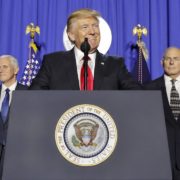Trump administration establishes stricter requirements for Medicaid, TANF, and food stamps
Amid the shocking news of airstrikes on Syria and President Donald Trump’s ongoing personal scandals, the president last week ordered for the major overhaul of the nation’s public assistance net.
Though the news largely went under the radar, Trump on Tuesday, April 10 signed an executive order called Reducing Poverty in America By Promoting Opportunity and Economic Mobility which calls for departments across the government to review their safety net programs and propose new regulations.
Some of the affected programs in this potentially significant move include Supplemental Nutrition Assistance Program (SNAP), Medicaid and housing assistance. The executive order directs agencies — including the departments of Commerce, Labor and Housing and Urban Development — to enforce current requirements as well as propose more stringent work requirements and give some flexibility to states to issue their own modifications.
Specifically, the order is directed at all agencies with “any program that provides means-tested assistance or other assistance that provides benefits to people, households or families that have low-income.”
“Since its inception, the welfare system has grown into a large bureaucracy that might be susceptible to measuring success by how many people are enrolled in a program rather than by how many have moved from poverty to financial independence,” reads the executive order.
The executive order also encourages these agencies to make cuts to these programs in order to save money.
The executive order has not put forth official policy, but experts say the notion of tougher requirements for these programs could have a drastic impact on low-income Americans.
In the case of Medicaid — the nation’s public health insurance program for low earners — the executive order calls for all applicants to provide proof of employment, which could stunt many Americans.
By tightening up the requirements for Medicaid, which is the last health care resort for many low-income Americans who do not qualify for programs like the Affordable Care Act, the options for the nation’s most vulnerable could be severely limited, according to Executive Vice President of the Kaiser Family Foundation Diane Rowland.
“What we’re talking about in Medicaid is saying that someone who doesn’t meet these requirements than can be locked out and not be able to get medical coverage for a certain number of months or maybe even up to a year,” Rowland told Michel Martin of NPR’s All Things Considered. “And they do say that there’ll be exceptions, but the president’s directive wants to narrow those exceptions. So really, some of the purposes of this is to get people off the rolls. And we know that for the people already working on Medicaid, the reason they need Medicaid is their job doesn’t come with health insurance that’s either available or affordable.”
Other programs that could see a dramatic shift include various housing programs, the and Temporary Assistance for Needy Families (TANF), which provides poor families with financial aid.
Experts and lawmakers alike have deemed the executive order as a reflection of the overall conservative agenda to slashing these programs and shrinking the federal safety net, programs which Democrats argue strengthen low-earning Americans.
“Attacks on successful programs like Medicaid, nutrition and housing assistance are attacks on millions of vulnerable Americans. No one can argue our nation is made stronger by cutting these priorities,” Sen. Kamala Harris (D-Calif.) said in a tweet on Tuesday, April 17.
Moreover, the White House has been accused of attempting to expand the definition of “welfare” — a term that has garnered a negative connotation since the Reagan administration — to include public programs like Medicaid and SNAP (aka food stamps) as a way to vilify them.
“This executive order perpetuates false and racist stereotypes about certain groups supposedly taking advantage of government assistance,” Reps. Steny Hoyer of Maryland and Barbara Lee of California said in a joint statement. (Klarize Medenilla/AJPress)








Good idea. A lot of people abuse the system.